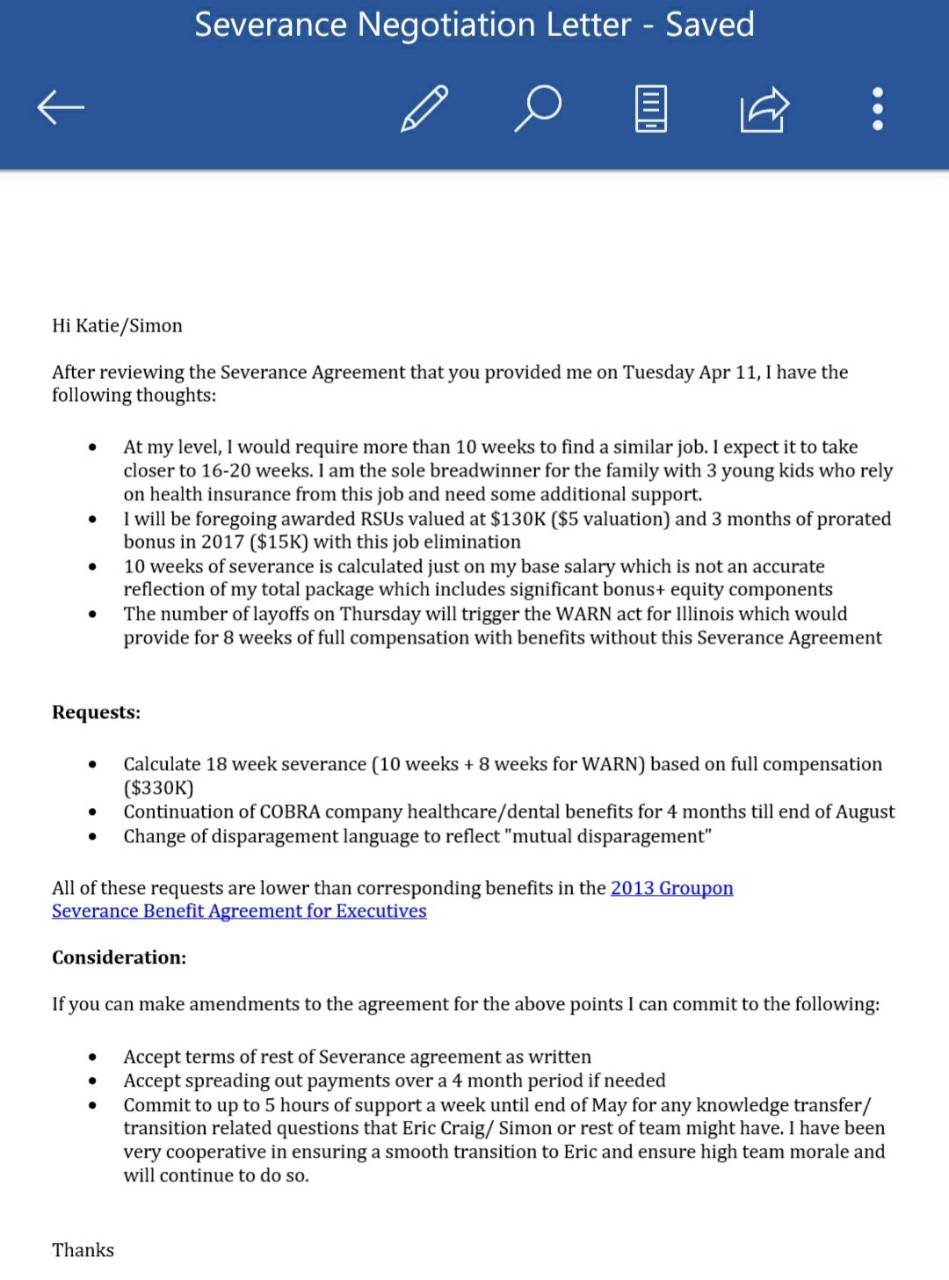Looking to negotiate a severance package? You’ve come to the right place. If you find yourself in a position where you need to part ways with your employer, it’s crucial to understand how to navigate the negotiation process effectively. From ensuring financial stability to securing additional benefits, negotiating a severance package can make a significant difference in your future. In this article, we’ll explore the essential steps and strategies to help you get the best possible outcome when it comes to negotiating a severance package. So, let’s dive right in.
How to Negotiate a Severance Package: A Comprehensive Guide
When it comes to leaving a job, negotiating a severance package can be an essential part of ensuring a smooth transition and financial security. This comprehensive guide will walk you through the process of negotiating a severance package, providing you with valuable insights, tips, and strategies along the way.
Understanding Severance Packages
A severance package is a financial arrangement provided to employees who are leaving a company, either voluntarily or involuntarily. It serves as a form of compensation to help individuals during the period of job transition.
Severance packages typically include various components, such as:
- Severance pay
- Continuation of benefits
- Outplacement services
- Non-compete agreements
It’s important to have a clear understanding of what is typically included in a severance package before entering into negotiations.
Evaluating Your Situation
Prior to initiating negotiations, it’s crucial to evaluate your situation and gather relevant information. Consider the following points:
- Reason for employment termination (layoff, company restructuring, resignation, etc.)
- Your length of service and overall performance within the company
- The company’s financial health and recent layoffs, if applicable
- Review of your employment contract and any relevant policies
- Comparison of industry standards for severance packages
By gathering this information, you’ll be better equipped to negotiate effectively and understand what you can reasonably expect from the process.
Preparing for Negotiations
Before entering into negotiations, it’s essential to be well-prepared. Consider the following steps:
- Educate Yourself: Research severance packages in your industry and gather information about what others have received in similar situations.
- Identify Your Priorities: Determine what is most important to you in the severance package. Is it the monetary compensation, benefits continuation, or other factors?
- Estimate Your Worth: Consider your contributions, skills, and experience within the company and use that as a basis to estimate the value you bring.
- Create a Proposal: Develop a well-structured proposal outlining your compensatory expectations, including specific details and reasoning.
By carefully preparing and organizing your thoughts, you’ll be in a stronger position to negotiate effectively.
Negotiating the Severance Package
As you enter into negotiations, keep these strategies in mind to maximize your chances of success:
1. Start on a Positive Note
Initiate the conversation with your employer by expressing gratitude for the opportunities and experiences you’ve had with the company. Starting on a positive note sets the stage for productive negotiations.
2. Emphasize Your Contributions
Highlight the ways in which you have positively impacted the company. Emphasize your accomplishments, successful projects, and any unique skills or knowledge you possess that adds value to the organization.
3. Stay Professional and Respectful
Throughout the negotiation process, maintain a professional and respectful demeanor. Avoid becoming confrontational or argumentative, as this can hinder productive discussions.
4. Stay Open to Compromise
While it’s important to have clear goals, it’s equally crucial to be open to compromise. Flexibility can help foster a positive negotiation environment and increase the chances of reaching a mutually beneficial agreement.
5. Leverage Your Value and Skills
Demonstrate to your employer how your skills and expertise can continue to benefit the company even after your departure. This can strengthen your position and potentially lead to an improved severance package.
6. Seek Legal Counsel, If Necessary
If you feel overwhelmed by the negotiation process or believe your rights are being violated, seeking legal counsel can provide invaluable guidance and representation.
Handling Rejection and Acceptance
During negotiations, it’s important to be prepared for various outcomes:
- If your employer rejects your proposal, remain calm and professional. Consider revisiting your proposal, modifying your expectations, or seeking alternative solutions.
- If your employer accepts your proposal, carefully review the agreement and seek clarification on any ambiguous terms. Ensure that all agreed-upon components are clearly outlined.
Wrapping Up
Negotiating a severance package can be a complex process, but by following these strategies and tips, you can significantly increase your chances of securing an advantageous agreement. Remember to evaluate your situation, prepare thoroughly, negotiate professionally, and be open to constructive compromises. With the right approach, you can navigate this transition successfully and set yourself up for a positive next step in your career.
How to Get More Severance – An Employment Lawyer Explains
Frequently Asked Questions
Frequently Asked Questions (FAQs)
1. How do I negotiate a severance package?
To negotiate a severance package effectively, follow these steps:
– Research the typical severance packages offered in your industry and position.
– Assess your value and contributions to the company.
– Prepare a list of reasons why you deserve a better severance package.
– Schedule a meeting with your employer to discuss the package.
– Clearly communicate your reasons, focusing on your achievements and contributions.
– Offer alternatives or compromises that could benefit both parties.
– Remain professional and calm throughout the negotiation process.
– Consider seeking legal advice or guidance if needed.
2. What factors should I consider when negotiating a severance package?
When negotiating a severance package, consider the following factors:
– Length of service with the company
– Position and level of responsibility
– Specific circumstances leading to the termination
– Market standards for severance packages in your industry
– Additional benefits such as health insurance continuation or outplacement services
– Any potential legal claims or disputes
– Personal financial needs and goals
3. How can I demonstrate my value to negotiate a better severance package?
To demonstrate your value and negotiate a better severance package:
– Highlight your accomplishments, achievements, and contributions during your tenure.
– Showcase any improvements or positive impact you made in the company.
– Back up your claims with measurable data or specific examples.
– Emphasize your skills, experiences, and expertise that add value to the organization.
– Be prepared to negotiate with confidence, using facts and evidence to support your case.
4. Should I seek legal advice before negotiating a severance package?
While not always necessary, seeking legal advice before negotiating a severance package can be beneficial, especially if you believe you have legal grounds for a stronger package. An employment attorney can help you understand your rights, evaluate the terms of the package, assess any potential legal claims, and provide guidance on how to negotiate effectively.
5. What are some alternative options I can propose during severance package negotiations?
When negotiating a severance package, you can propose alternative options such as:
– Extending the period of payment or offering a lump-sum payment
– Including additional benefits, like continued health insurance coverage
– Requesting assistance with job placement, networking, or career counseling
– Negotiating the terms of a non-compete agreement, if applicable
– Exploring the possibility of reassignment or transfer within the company
– Requesting a positive reference or recommendation letter
6. How do I remain professional and calm during severance package negotiations?
To remain professional and calm during severance package negotiations:
– Prepare your talking points and practice beforehand to build confidence.
– Stay focused on the facts and your desired outcome rather than personal emotions.
– Listen actively to the employer’s perspective and respond thoughtfully.
– Use respectful and assertive language, avoiding aggression or defensiveness.
– Take breaks if needed to maintain composure and gather your thoughts.
– Remember that negotiation is a two-way process; try to find mutually beneficial solutions.
7. Can negotiation techniques be used to improve a severance package?
Yes, negotiation techniques can be applied to improve a severance package. Some effective negotiation techniques include:
– Active listening and asking open-ended questions
– Building rapport and finding common ground
– Using the “flinch” technique to express surprise or disappointment
– Offering multiple options to increase the likelihood of finding agreement
– Remaining patient and not rushing decisions
– Using a collaborative, problem-solving approach rather than an adversarial one
8. What should I do if I’m not satisfied with the outcome of severance package negotiations?
If you’re not satisfied with the outcome of severance package negotiations, you have several options:
– Assess the benefits offered and determine if they still meet your needs.
– Consider consulting with an employment attorney to explore legal options.
– Discuss your concerns with trusted colleagues or mentors for advice.
– Evaluate other alternatives, such as pursuing unemployment benefits or a new job opportunity.
– Keep in mind that accepting the package may be the best course of action if further negotiation is unlikely to yield better results.
Final Thoughts
Negotiating a severance package can be a daunting process, but with the right approach, you can secure a favorable outcome. Start by understanding your rights, entitlements, and the company’s policies. Research industry standards and gather evidence to support your negotiation points. Articulate your value and contributions to the company, emphasizing the benefits of a mutually agreeable separation. Be patient, flexible, and open to compromise during the negotiation. It’s important to maintain a professional and respectful demeanor throughout the process. Keep in mind that seeking legal advice can also be beneficial. By following these steps, you can navigate the process of negotiating a severance package successfully.


